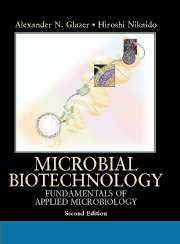Book contents
- Frontmatter
- Contents
- Preamble
- Acknowledgments
- 1 Microbial Diversity
- 2 Microbial Biotechnology: Scope, Techniques, Examples
- 3 Production of Proteins in Bacteria and Yeast
- 4 The World of “Omics”: Genomics, Transcriptomics, Proteomics, and Metabolomics
- 5 Recombinant and Synthetic Vaccines
- 6 Plant–Microbe Interactions
- 7 Bacillus thuringiensis (Bt) Toxins: Microbial Insecticides
- 8 Microbial Polysaccharides and Polyesters
- 9 Primary Metabolites: Organic Acids and Amino Acids
- 10 Secondary Metabolites: Antibiotics and More
- 11 Biocatalysis in Organic Chemistry
- 12 Biomass
- 13 Ethanol
- 14 Environmental Applications
- Index
- Plate section
12 - Biomass
Published online by Cambridge University Press: 05 June 2012
- Frontmatter
- Contents
- Preamble
- Acknowledgments
- 1 Microbial Diversity
- 2 Microbial Biotechnology: Scope, Techniques, Examples
- 3 Production of Proteins in Bacteria and Yeast
- 4 The World of “Omics”: Genomics, Transcriptomics, Proteomics, and Metabolomics
- 5 Recombinant and Synthetic Vaccines
- 6 Plant–Microbe Interactions
- 7 Bacillus thuringiensis (Bt) Toxins: Microbial Insecticides
- 8 Microbial Polysaccharides and Polyesters
- 9 Primary Metabolites: Organic Acids and Amino Acids
- 10 Secondary Metabolites: Antibiotics and More
- 11 Biocatalysis in Organic Chemistry
- 12 Biomass
- 13 Ethanol
- 14 Environmental Applications
- Index
- Plate section
Summary
We all have dreamed of producing an abundance of useful food, fuel, and chemical products from the cellulose in urban trash and the residues remaining from forestry, agricultural, and food-processing operations. Such processes potentially could: 1) help solve modern waste-disposal problems; 2) diminish pollution of the environment; 3) help alleviate shortages of food and animal feeds; 4) diminish man's dependence on fossil fuels by providing a convenient and renewable source of energy in the form of ethanol; 5) help improve the management of forests and range lands by providing a market for low-quality hardwoods and the other “green junk” that develops on poorly managed lands; 6) aid in the development of life-support systems for deep space and submarine vehicles; and 7) increase the standard of living – especially of those who develop the technology to do the job! At present, all of these aspirations are frustrated by two major features of natural cellulosic materials, crystallinity and lignification.
– Cowling, E. B., and Kirk, T. K. (1976). Properties of cellulose and lignocellulosic materials as substrates for enzymatic conversion processes. Biotechnology and Bioengineering Symposium, 6, 95–123.Biomass can have broader definitions, but in the context of biotechnology, it is generally taken to mean “all organic matter that grows by the photosynthetic conversion of solar energy.” The sun, either directly or indirectly, is the principal source of energy on earth, its power converted to a usable organic form – biomass – by green plants, algae, and photosynthetic bacteria.
- Type
- Chapter
- Information
- Microbial BiotechnologyFundamentals of Applied Microbiology, pp. 430 - 457Publisher: Cambridge University PressPrint publication year: 2007
- 1
- Cited by



